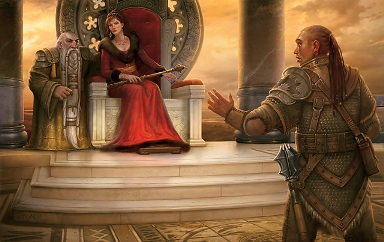
![]() Your characters’ highlight reel throughout a campaign includes scenes of all kinds, from the dramatic and humorous to the glorious and proud, in and out of pitched battle and fiery dialogue. One critical aspect of your characters’ rich and memorable stories are their trained skills. Could your characters’ trained skills use more stage time in your campaign?
Your characters’ highlight reel throughout a campaign includes scenes of all kinds, from the dramatic and humorous to the glorious and proud, in and out of pitched battle and fiery dialogue. One critical aspect of your characters’ rich and memorable stories are their trained skills. Could your characters’ trained skills use more stage time in your campaign?
Your check bonus, while often impressive, is actually secondary – the fact that you’ve trained in these skills means they are a core part of the vision you have for your adventurer.
For example, if you trained in Intimidate, you obviously find opportunities to use Intimidate during your adventures enjoyable (whether specifically for your character, or for your personality as a player, or some combination of both) – so make sure you look for opportunities as a player to use this skill in your adventures! Just like powers, you want the investment and choice to be useful and memorable throughout a campaign, and part of its utility throughout a D&D game is up to you.
That said, as a DM, remember that featuring the party’s trained skills in adventures are important to their enjoyment of the game and their characters. Again, trained skills should especially be featured in your adventures and encounters as alternative goals, or different ways to meet challenges and devise solutions. Your PC party’s trained skills are as much a part of their characters’ visions and story as their combat abilities and background.
Provide subtle clues throughout encounters or adventures for opportunities for characters to use those skills they’ve invested in, especially if they both trained in it and have racial, feat or item bonuses to those skills. This is especially important with skills that are typically trained rarely – if a character trains in Insight, the social equivalent of Perception, then you want to be sure to include a few cheats and liars in your game, so that character can have some memorable scenes where he or she catches those scoundrels in the act!
What the players are trying to tell you with trained skills is they want stage time surrounding those skills – that it would be “cool” to lie their butts off to or scare the hell out of the local squeamish, wiry constable with their trained Bluff or Intimidate skills on their dragonborn, half-orc, tiefling or changeling characters. Or that using the same skills against kobolds, goblins, orcs, giants or even dragons would be just as compelling once in a while. So craft up a simple situation and a call for a check or two or create a short skill challenge situation for the PCs to show off their trained skill brilliance.
A great way to get inspired, whether you’re a PC or DM, is to look over the Rules Compendium‘s section on Improvisation (originally from DMG2, perhaps D&D’s best storytelling tips book ever), as well as the skill section that includes a few bullet points for each skill. Those bullet points are part of an “Improvising with [Skill Name]” section for each skill. Every skill lists a few situations or actions and a related easy, moderate or hard DC.
For example, you could use Heal to identify a disease plaguing someone or a fresh corpse (hard DC of the disease’s level) – and impress your friends and the local village folk and farmers with your CSI-style expertise and insight, Doctor.
Or say a unique magical trap in the Tomb of One Thousand Storm Kings includes both opportunities for Thievery and History. Perhaps History checks help gain clues related to a word puzzle or riddle about the nation’s royal lineage, and such insights provides the safest and most direct key to disabling the trap. Here, both characters trained in Thievery and History win, both not only feeling, but being important to the scene and challenge. Your eladrin, deva, dragonborn and halfling heroes will especially enjoy these moments.
Whether you’re a player or DM, use the tips above to seek creative, engaging and immersive ways to feature trained skills throughout your story – remember, they need stage time to truly shine!
[…] can still feel like “work” for the DM more than they feel like “fun.” Skill Challenges. Fitting a storytelling element into some sort of scoreboard format and chaining a few skills […]
[…] this article? You might also like Trained Skills Need Stage Time and Rituals […]